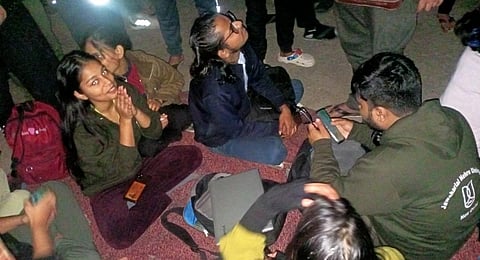

NEW DELHI: The JNU students' union (JNUSU) could not hold the proposed screening of a controversial BBC documentary on Prime Minister Narendra Modi with a student outfit alleging that the varsity's administration snapped power and Internet connections at the union's office.
Students, however, downloaded the documentary on their mobile phones through an online application to watch and share it, All India Students Association (AISA) national president N Sai Balaji claimed.
Stone pelting was reported at the university campus in the national capital when the documentary was being screened. The main gate has been closed by the administration.
Stones and even bricks were hurled at JNU Students' Union officer bearers. JNUSU president Aishi Ghosh claimed stones were thrown at students and JNUSU members who were watching the documentary. One person has reportedly been injured in the incident.
Following the incident, the Left-wing student group held a protest at the University campus, shouting slogans against ABVP and Bharatiya Janata Party (BJP).
Meanwhile, two members associated with the ABVP were nabbed by the students for allegedly pelting stones. They were to be handed over to the Delhi Police at Vasant Kunj Police station.
However, the Deputy Commissioner of Police (South West) said that “No such incident has been reported to us so far.”
"Around 8:50 pm, the university administration cut off the electricity supply of the JNUSU office, which resulted in the delay in screening," said one of the students. He also alleged that the Wifi services of the venue were also stopped by the administration.
After waiting for half an hour, the student union decided to share the Quick Response (QR) code of the documentary among the participants and viewed it on their mobile phones in a public gathering.
Attacking Akhil Bharatiya Vidyarti Parishad (ABVP), the JNUSU president Aishe Ghosh said, “If ABVP had a problem with screening, then they should also hold a parallel screening or debate on it.”
Ghosh further added that the nexus of University administration and ABVP is vanishing in the debate and discussion culture on the campus.
"They can cut off the light and Internet connection but not our resistance. Instead of one screen, now this screen will be watched on multiple screens," she added.
The government had on Friday directed social media platforms Twitter and YouTube to block links to the documentary titled "India: The Modi Question".
The Ministry of External Affairs has trashed the documentary as a "propaganda piece" that lacks objectivity and reflects a colonial mindset.
However, opposition parties have slammed the government's move to block access to the documentary.
Balaji, who was present for the screening, claimed that some students had downloaded the documentary on their mobiles and other devices.
"They (the JNU administration) have cut off the power and Internet. We shared the documentary with other students and are watching it together," Balaji said. Balaji also claimed that there were police personnel in civil clothes roaming on the campus. However, there was no immediate police response.
Earlier in the evening, the University had heightened the security around the campus to prevent any form of violence. Adding to this, the Delhi police also deployed extra security personnel to maintain the law and order situation at the University.
According to a police official, around 50 police personnel along with University security guards were deployed at the campus.
(With inputs from PTI)